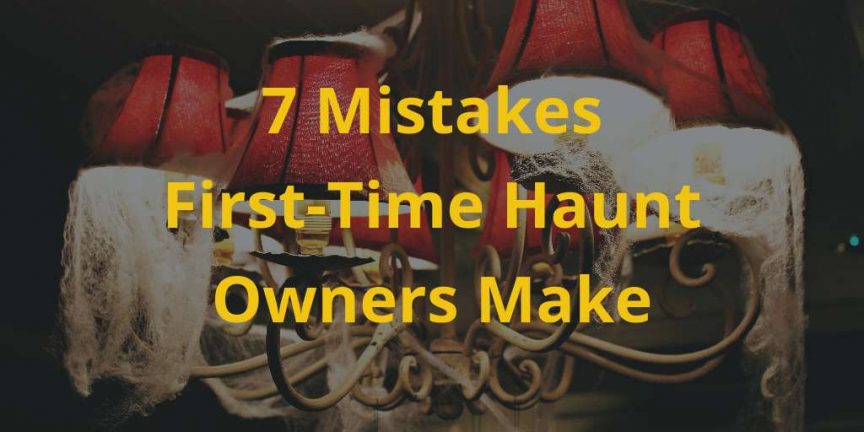Starting up a new haunt is exciting. It’s a dream-come-true to turn all the scariest ideas from your imagination into a chillingly fun experience for thousands of fans.
A lot of haunt owners get into the business because we are passionate about the haunting experience, we love delivering a great scare. And that’s a good thing! Passion is an important element in any successful business.
If you’re a new haunt owner, it’s easy to overlook some of the administrative parts of your business or to overdo things during your first haunt season.
Even if you’ve been in the industry for years and are embarking on your first solo haunt, there may be a few things about the business that surprise you. Read on for five mistakes first-time haunt owners commonly make.
1. Building Too Much
You don’t have to build every single idea in your first year. You want to deliver an amazing experience, yes, but you can also leave some room for growth and the build-out of new rooms or different experiences.
Holding off on a few ideas will also save money. Few haunts rake in millions of dollars during their first couple of years in operation; you don’t want to break the bank before your first guest walks through the door.
2. Pinching Too Many Pennies
While you don’t want to overspend, you shouldn’t skimp on your haunt experience, either. Particularly during your first year, the quality of your scares helps guests will determine whether they want to return again next season and whether they will recommend your haunt to their friends.
It’s a delicate balance. But expensive props or upscale animatronics don’t always guarantee an impressive haunt experience. Sometimes low-tech, creative scares are even more fun.
3. Assuming Customers Will Just “Show Up”
No matter how impressive your haunt is, it takes some effort to get the word out when you’re first starting out. How will fans find out about your haunt? You can’t expect a line around the block on opening night if you haven’t made an effort to market your haunt.
You’ll also need a plan for ongoing customer engagement. Will you send news and special deals through an email newsletter? What about social media?
4. Ignoring Your Bank Balance
Cash flow and profit are not the same things. Just because you have revenue coming in does not mean everything is going fine. It’s important to have a solid understanding of your haunt’s costs and when payments are due so that you can make payroll and pay your bills on time.
5. Forgetting About Ticketing
You’ve thought through every detail of your haunt’s experience. The props are built, the actors are prepped, you’re ready to open. Are you forgetting anything? Oh, tickets! You need to sell admission to make a profit.
If you don’t have your ticketing set up in advance, your guests’ only option will be to pay cash at the door. The average person carries less than $40 in their pocket, and you might have to turn some guests away if you can’t accept credit cards.
Even if you have credit card swipers on site, you’re leaving money on the table if you forget to set up online ticket sales. Customers spend significantly more money when purchasing tickets online. That means they’re more likely to upgrade to VIP passes or purchase merchandise online than they would be on site.
With HauntPay, you can get set up and start selling tickets in just a few minutes (really!). Find out how!
6. Not Getting Enough Insurance
Insurance is something every haunt needs, but that you hope you never have to use. A relatively minor incident can end up bankrupting even the best haunts if you aren’t protected.
Even if a situation wasn’t your fault – maybe a guest did something they were not supposed to or failed to follow your terms of service – you could be tied up in litigation for months (or years) trying to prove you’re not liable. Insurance can help cover those types of unexpected costs and protect you from liability nightmares.
7. Micromanaging
Wanting to oversee every single detail of your haunt is understandable. It’s your baby, your vision.
In some cases, obsessively pouring over the details of your business can be helpful. But you also need to be able to delegate, too! Hire people on your team who you can trust and who do good work, and let them do their jobs. It will not only be less stressful, it will free you up to focus on running your business.
With a little advance planning, you can build a great haunt that keeps fans coming back year after year. We hope your first scare season – and every season after that – is successful.
What lessons did you learn when starting up a new haunt? Which parts of the business were most challenging? We’d love to hear your stories in the comments!

